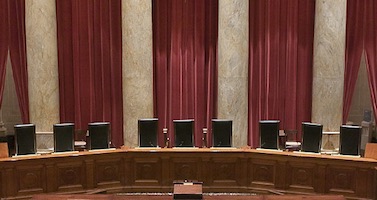“The amici contend that the CAFC opinion threatens university participation in the U.S. innovation economy, specifically the patent system.”
 On October 15, 12 state universities and state university systems filed an amicus brief in support of the University of Minnesota in its appeal to the U.S. Supreme Court of the June 2019 Federal Circuit (CAFC) ruling in Regents of the University of Minnesota v. LSI Corporation. In that decision, the CAFC said that the University of Minnesota (UMN)—an arm of the state of Minnesota—is not protected by state sovereign immunity from a number of inter partes review (IPR) petitions filed against UMN patents by LSI Corporation (LSI). The court relied heavily on its 2018 decision in Saint Regis Mohawk Tribe v. Mylan Pharmaceuticals Inc., 896 F.3d 1322 (Fed. Cir. 2018), which found that “tribal sovereign immunity cannot be asserted in IPRs.” Despite UMN’s arguments to the contrary, the Federal Circuit answered a question left open in its decision in Saint Regis Mohawk by concluding today that “the differences between tribal and state sovereign immunity do not warrant a departure from the reasoning in Saint Regis.” More information on the ruling can be found here.
On October 15, 12 state universities and state university systems filed an amicus brief in support of the University of Minnesota in its appeal to the U.S. Supreme Court of the June 2019 Federal Circuit (CAFC) ruling in Regents of the University of Minnesota v. LSI Corporation. In that decision, the CAFC said that the University of Minnesota (UMN)—an arm of the state of Minnesota—is not protected by state sovereign immunity from a number of inter partes review (IPR) petitions filed against UMN patents by LSI Corporation (LSI). The court relied heavily on its 2018 decision in Saint Regis Mohawk Tribe v. Mylan Pharmaceuticals Inc., 896 F.3d 1322 (Fed. Cir. 2018), which found that “tribal sovereign immunity cannot be asserted in IPRs.” Despite UMN’s arguments to the contrary, the Federal Circuit answered a question left open in its decision in Saint Regis Mohawk by concluding today that “the differences between tribal and state sovereign immunity do not warrant a departure from the reasoning in Saint Regis.” More information on the ruling can be found here.
Petition and Amici
Following this decision, the University of Minnesota filed a petition for writ of certiorari with the Supreme Court in September. Multiple briefs have now been filed in support of UMN’s petition. Most recently on October 15, 12 state universities and state university systems filed an amicus brief. These universities own thousands of patents collectively, and therefore have an interest in the outcome of a Supreme Court decision on the case. The amici contend that the CAFC opinion threatens university participation in the U.S. innovation economy, specifically the patent system. They argue that sovereign immunity has always helped preserve the competitiveness of schools in an innovation economy by affording them the ability to choose if, when, and where to litigate their patent rights. Therefore, the state universities argue that the Supreme Court must continue to allow them to participate in the patent system as sovereign entities.
In its 149-page petition to the Supreme Court, UMN cited Fed. Mar. Comm’n v. S.C. State Ports Auth., arguing that state entities have sovereign immunity to suits by private parties before courts and “court-like administrative tribunals,” such as the Patent Trial and Appeal Board (PTAB). The question thus presented to the court is:
“Whether the IPR proceedings brought by private respondents against UMN in this case are barred by sovereign immunity.”
Citing Alden v. Maine, UMN stressed that state immunity from suit by private parties is fundamental to state sovereignty. UMN argued that litigation of patent infringement must be managed carefully by state universities due to their investment of billions of dollars of public funds into patent-producing research. UMN explained that profits made from the licensing of these patents are reinvested into research and educational programs, and in ensuring these profits are collected, occasionally a state university must sue private parties for patent infringement. As outlined in Tegic Commc’ns Corp. v. Bd. of Regents of the Univ. of Tex. Sys., where a university files suit against a private party for infringement it waives its sovereign immunity to patent invalidity defenses asserted by the defendant. However, UMN argued, until the state university files suit it remains immune to private litigation seeking to challenge its patents’ validity. UMN filed patent infringement suits in federal court and then LSI filed petitions for IPR with the PTAB at the U.S. Patent and Trademark Office (USPTO). Therefore, the specific question that remains is:
Did UMN’s sovereign immunity prohibit a change in forum for litigating the validity of UMN’s patents, absent the consent of UMN?
In holding that sovereign immunity did not apply in this case, the CAFC admitted that immunity extends to “court-like administrative tribunals” but argued that it did not extend to this case because IPRs are “more like an agency enforcement action than a civil suit by a private party.” The CAFC also noted that states are not immune from suits brought by the federal government. This holding went directly against PTAB precedent, which holds that IPR proceedings are adjudicative proceedings between the patent challenger and patent owner, which is in and of itself “court-like,” said UMN’s petition. Therefore, UMN argued, it is of consequence that the Supreme Court hear the appeal because this new form of nonconsensual litigation implicates billions of dollars of intellectual property rights, affecting state universities nationwide.
Additional Support
In addition to the above amicus brief, on October 15 an amicus brief was filed by 17 states in support of UMN’s petition for a writ of certiorari. These states argue that they, too, have an interest in Supreme Court review of this case because the CAFC’s decision implies that states themselves may be hauled in front of a federal administrative tribunal when private parties institute an IPR. The brief goes on to state that a nonconsensual IPR proceeding should be barred under sovereign immunity because the proceeding “walks, talks, and squawks like a lawsuit.”
The Association of Public and Land-grant Universities also filed a brief on October 12. Echoing similar concerns, the Association argues that if the decision is allowed to stand, it would have significant negative consequences for public universities and society.

![[IPWatchdog Logo]](https://ipwatchdog.com/wp-content/themes/IPWatchdog%20-%202023/assets/images/temp/logo-small@2x.png)

![[Advertisement]](https://ipwatchdog.com/wp-content/uploads/2024/04/UnitedLex-May-2-2024-sidebar-700x500-1.jpg)
![[Advertisement]](https://ipwatchdog.com/wp-content/uploads/2024/04/Artificial-Intelligence-2024-REPLAY-sidebar-700x500-corrected.jpg)
![[Advertisement]](https://ipwatchdog.com/wp-content/uploads/2024/04/Patent-Litigation-Masters-2024-sidebar-700x500-1.jpg)

![[Advertisement]](https://ipwatchdog.com/wp-content/uploads/2021/12/WEBINAR-336-x-280-px.png)
![[Advertisement]](https://ipwatchdog.com/wp-content/uploads/2021/12/2021-Patent-Practice-on-Demand-recorded-Feb-2021-336-x-280.jpg)
![[Advertisement]](https://ipwatchdog.com/wp-content/uploads/2021/12/Ad-4-The-Invent-Patent-System™.png)






Join the Discussion
6 comments so far.
Independent Inventor 1941 Irl Sanders III
October 24, 2019 03:34 pmMy only hope in the past to protect my many potential inventions from certain theft by corporations or invalidation (same as thievery) by the PTAB, Court Judges and corporations was to deed a percentage of the patent, or totally, to a State or a State entity where we could share any income that results.
Independent Inventor 1941 Irl Sanders III
October 24, 2019 03:17 pmThe opinion(s) of examiners and others including competitors or potential competitors, the PTAB and Judges that the invention can be backward created by combining multiple prior arts, sometimes as many as six, to crudely (or wishfully thinkingly) approximate maybe somewhat something possibly like the invention does not qualify as an error. Only a “physically” existing “product” that is available to the public and that one may believe is equivalent should have the standing to be considered as possibly preempting.
Independent Inventor 1941 Irl Sanders III
October 24, 2019 03:15 pmAll patent owners should have the same or similar rights the Universities want. That is a patent (property right) that is inviolate except where there is a clear and convincing significant error(s) in its issuance that cannot be corrected by a reissue application. One exception would be clear evidence of fraud on the part of the applicant.
Mud
October 23, 2019 05:34 pmThe brief from the schools is compelling. But because the case involves patents, the SCOTUS will probably ignore it. Never mind the broad 11th Amendment implications of the whole thing.
Bemused
October 23, 2019 11:59 amYeah, I’m betting that SCOTUS denies this petition. After all, can’t have SCOTUS issuing any ruling that (heavens forbid!) may actually be in favor of patent holders!!!
Pro Say
October 22, 2019 05:26 pm” . . . it would have significant negative consequences for public universities and society.”
No kidding. But then again, no more so than the significant negative consequences for society which have resulted from the birth of the AIA and its PTAB Death Squad.
What our universities and states should also do is join with all those calling for the abolition of — at a bare minimum — the unconstitutional, innovation-stealing agency “trials.”
Let the APJ “judges” go back to doing honest work on behalf of innovative American companies, our universities, and independent inventors.
Like a spoonful of sugar; it’s good for you.